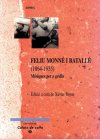Feliu Monné i Batallé was born on 15/2/1864 in Olesa de Montserrat (in the province of Barcelona). His father and his brothers and sisters studied music and played instruments, as did most of the descendants of the family; his life thus always revolved around various aspects of music: he was a performer on the piano, organ and violin, taught theory of music and certain instruments, and wrote varied and extensive arrangements and compositions. At an early age he went with a brother of his to live in Esparreguera, where he settled down.
At the age of 21 he helped in the forming of the Cobla Orquestra Monnés, as a member of which he played in many venues, though particularly in Esparreguera itself, for festivities, processions, masses etc. He also conducted various choral groups and took part, as performer or organiser, in various classical-music concerts.
Despite family adversities, he took charge of his grandson's musical education Àngel, who adored the music of his grandfather Feliu. He died in Esparreguera on 23/1/1935, performing and composing to the very end.
The works of Feliu Monné run to some 500 titles: we find a strong corpus of religious music, music for sardanas (traditional Catalan dances) and popular pieces. However, the most significant body of his work lies in music for dancing, usually arranged for orchestra, though also for piano, for the traditional cobla bands, for the gralla (a Catalan shawm) or for small string ensembles. He also wrote music for the Passion staged each year in Esparreguera.
His music for gralla, published in our volume 'Feliu Monné i Batallé (1864-1935): músiques per a gralla', was commissioned by music associations of the time, since his lifetime coincided with what we might call the golden age of the gralla.









